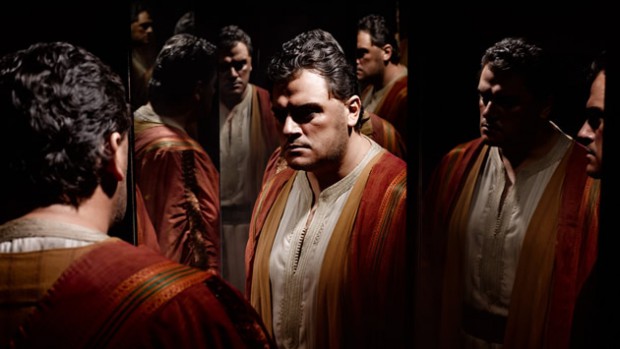The new production of Verdi’s Otello at the Met, with set designs by Ed Devlin, did make me wonder, as I watched it in the Cambridge Picture House, why they had bothered, since in no respect does it improve on many traditional productions. The sets are kind of sumptuous, but then what looked like a solid wooden or stone building turns out to be perspex, with neon lighting, and liable to slide around for no obvious reason. The costumes are suitably period, lavish, spotless. From the cinema-goer’s point of view, the most irritating thing is that the camera remains almost always on the person singing. This is especially exasperating in Otello, where so many of the scenes of dialogue take place between someone who is attempting to have a strong effect on the other person, and the recipient’s response is just as crucial as that of the speaker/singer. So for instance Iago’s successive successful attempts to goad Otello into murderous jealousy, and Desdemona’s harrowingly tactless appeals for clemency for Cassio. In perhaps the most painful scene in the whole opera, at the start of Act III, Desdemona pleads, while Otello moves from ironic courtesy to violence. We had Desdemona singing her marvellous music, but only a 0.5-inch glimpse of Otello almost yielding and then pulling back and delivering his final brutal reply.
That apart, there’s not much in the way of production at all, which by now comes as some relief. For some reason in the very opening Desdemona and Emilia are wandering around in front of the anxious crowd awaiting Otello’s ship’s arrival, with notably little in the way of anyone’s being battered by a storm. Otello’s great opening statement didn’t find Aleksandrs Antonenko at his strongest, in fact it could have been overlooked by a newcomer. After that he proved a powerful singer and a reasonable actor, but unlikely to elicit any pity or terror from the audience. Postures in this production are stiff, and I suspect that that is what Antonenko finds most congenial.
The star of the show is unquestionably Zeljko Lucic, who was so sensational a Macbeth last season. Understated in his menace, but threatening throughout, he is a fine actor using his dark voice with great skill. Sonya Yoncheva, fine to see and wonderfully dressed, said in the intermission interview that she was trying to present an active, courageous Desdemona, but like virtually all performers of the role, she seemed, for the first three acts, to be merely a lovely voice, only becoming someone individual in her account of the lengthy Willow Song. The minor roles were all strongly taken, with a striking Cassio from Dimitri Pittas. Yannick Nézet-Séguin’s conducting was less ferocious than usual, with some gain in subtlety but more loss is propulsion. In a great performance Otello can be one of the most upsetting of operas, but this wasn’t much more than touching.






Comments